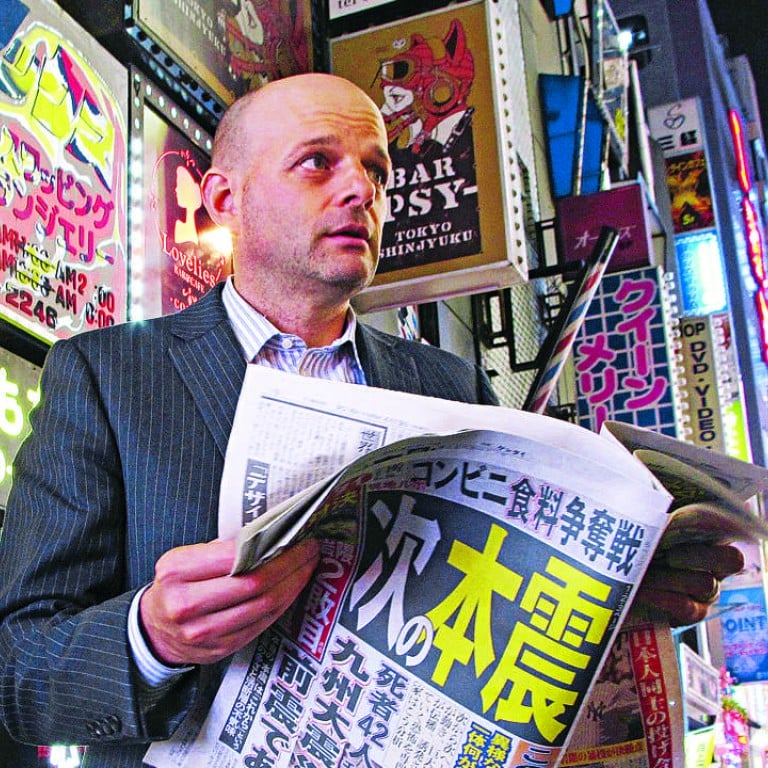
Sex, crime and the bizarre: Meet the American covering tabloid Tokyo warts and all online
Brett Bull’s website, The Tokyo Reporter, is dedicated to unusual stories often ignored by the mainstream Japanese media.
Gangsters, the sex trade, gruesome murders, adult videos, body discoveries, suicides, police up to no good. These are the core things Brett Bull looks for after hours. Not to participate, of course, but to write them up.
The 47-year-old Californian is an engineer in Tokyo by day, proprietor of website The Tokyo Reporter by night. Bull has created a site that, as its tagline says, delivers “salacious news on crime and culture”. Imagine a hybrid of the National Enquirer, the New York Post and Penthouse. Published online. In Japan.
There is the recent story about the Buddhist monk charged with murdering a nail artist. And the one about the playboy antics of a limbless author who was being considered as a political candidate by Prime Minister Shinzo Abe’s party. Or the piece about the husband who used garden shears to cut off the penis of a man he suspected was fooling around with his wife – and then flushed it down the toilet.
Japan is supposed to be a safe country,” Bull said. “But based on what I read, I really don’t know that’s true
“Japan is supposed to be a safe country,” Bull said. “But based on what I read, I really don’t know that’s true.”
Bull arrived in Tokyo 17 years ago, speaking no Japanese, on a short visit. But then he saw a job ad from a construction company and the rest is history. He began taking some Japanese lessons and he started going out after work with his colleagues from the engineering firm to “hostess bars”.
Hostess bars – and their newer, much rarer cousin, the host bar – are a unique part of Japanese nightlife. Often viewed in the West as tantamount to brothels, for the most part they are just bars where men pay to chat with and be served high-priced drinks by young, attractive women.
“Back in the day, my office was taking me to these hostess clubs,” Bull said. “The everyday experience was not being touched upon in the regular media.”
So he started turning his conversations with hostesses into interviews and contributing them to a friend’s website, along with other pieces on film and culture.
In 2008, he started his own site, The Tokyo Reporter, as a standalone home for all the grisly news that is overlooked in the mainstream media. He trawls through Japan’s weekly tabloids in search of juicy tales about the Japanese mafia, its roaring porn industry and steady stream of macabre murder cases. Then he translates the stories and posts them on his site.
Bull’s first hit story on The Tokyo Reporter, translated from a Japanese paper, was about the North Korean military training female agents as honey traps: “It really became big, it knocked the site off-line.”
More recently, opponents of migration in Europe seized upon a report that two Turkish men applying for refugee status in Japan were accused of raping and robbing a woman in Tokyo. The opponents pointed to it as evidence for refusing refugees.
It’s very easy to come up with an interesting story that other people aren’t covering
“It’s very easy to come up with an interesting story that other people aren’t covering,” Bull said.
There’s the husband-and-wife team from Fukuoka who were basically staging their own fight club, as he put it. The people who died ended up going through a rock grinder.
“It was something like something out of Fargo,” Bull said, referring to the Coen brothers’ film in which a body goes into a wood-chipper.
The Tokyo Reporter gets about 120,000 unique visitors a month, mostly men in their 30s. About half are from Japan and the other half is from the English-speaking world, mainly from the United States. While some of the stories, especially those involving crime, are reported in the mainstream media, these are often pared-down report dictated to reporters by the police press offices. Bull said English versions of Japanese news sites are preoccupied with “trying to make Japan look good”.
“It’s almost like these are public-relations departments for the government of Japan,” he said. “It makes for boring reading.”

